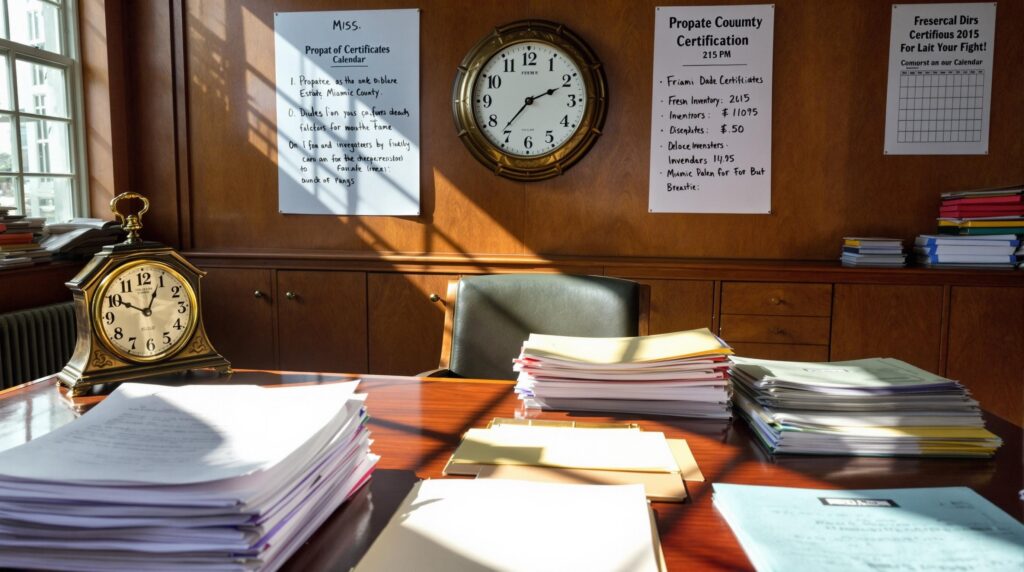The Miami probate process comes in three types depending on how much money and property are involved: formal probate for estates worth more than $75,000, summary probate for estates under $75,000, and a simple transfer process for very small estates. To start, you’ll need a death certificate (costs $15), the original will, and paperwork called a petition for administration ($231-$400), which you file with Miami’s court system. Someone called a personal representative takes charge of handling the estate. This person must make a list of everything the deceased person owned within 60 days and let any people or companies the deceased person owed money to know about the death. These creditors then have 90 days to ask for payment. The whole process must follow Florida’s laws and court rules, with specific steps along the way. Getting these steps right helps make sure the estate is properly settled through Miami-Dade County’s court system.
Key Takeaways
- Miami probate requires filing a Petition for Administration, death certificate, and original Will with the Circuit Court Probate Division.
- Personal Representatives must be appointed by the court and receive Letters of Administration to manage estate affairs.
- Complete asset inventory and professional appraisals must be submitted to the court within 60 days of appointment.
- Creditors have 90 days from notice publication or 30 days from direct notification to file claims against the estate.
- Choose between formal probate for estates over $75,000, summary probate under $75,000, or disposition without probate for small estates.
Types of Probate in Miami
In Miami, following Florida law, there are three ways to handle someone’s estate after they die: formal probate, summary probate, and disposition without probate.
Formal probate is the most detailed process, needed when an estate is worth more than $75,000 or when someone has died within the last two years.
Summary probate is a shorter process that works for estates under $75,000 or when someone has been dead for over two years.
Disposition without probate is for very small estates where the costs of the funeral and final medical bills from the last 60 days are higher than the value of what the person owned, not counting protected property.
Each of these methods must follow specific rules and timing set by Florida law.
Initial Filing Requirements
To start probate in Miami, you need to file key papers with the Circuit Court’s Probate Division. These papers lay the groundwork for handling the estate and help stop any fights over the will. The court needs certain papers to check the estate’s worth and handle tax matters.
| Required Paper | Why It’s Needed | Cost |
| Death Certificate | Shows person has died | $15 |
| Original Will | Shows how to split assets | Included |
| Petition for Administration | Starts the legal process | $231-$400 |
| Notice to Creditors | Tells people owed money | Cost of publishing |
You must also file a list of what the person owned, court orders to be signed, and details about who gets what. The court looks at everything to make sure it follows Florida law before letting someone take charge of the estate.
Role of Personal Representative
A personal representative handles three main tasks when someone dies in Miami: taking care of the dead person’s belongings, paying bills the person left behind, and giving out assets to family members and others named in the will.
To become a personal representative, you must ask the Miami-Dade County Probate Court by filing papers, including the original will if there is one. The court then gives you an official document called Letters of Administration that lets you handle the estate’s business.
Your jobs include making a list of what the person owned, telling creditors about the death, paying taxes, and keeping good records of all money matters.
Florida rules say personal representatives must live in Florida or be directly related to the person who died. They also need to get insurance called a bond to protect the estate, unless the will or the heirs say it’s not needed.
Throughout the process, the representative must answer to both the court and the heirs about their actions.
Asset Inventory and Appraisal
After being chosen by the probate court, the person in charge must make a full list of everything the deceased person owned. This means checking and writing down all items that go through probate, such as homes, cars, money in the bank, stocks, and personal belongings.
The person in charge needs to get experts to figure out what big-ticket items were worth when the person died. In Miami-Dade County, licensed experts must look at houses and valuable items that cost more than certain amounts.
Within 60 days of being picked for the job, the person in charge must give the court this list and all papers showing what things are worth. This paperwork becomes an official part of the probate process and helps decide how to split up belongings and handle taxes.
Creditor Claims and Deadlines
When someone starts a probate case in Miami-Dade County, they must tell all people who are owed money by the deceased.
The person handling the estate puts notices in local papers and sends letters to known creditors. After this, creditors have set time limits to ask for payment – 90 days from when the notice appears in the paper, or 30 days from getting a direct letter.
The person in charge of the estate must check if each money claim is real within these time limits. If they think a claim isn’t right, they can fight it.
For claims that are real, Florida law sets rules about who gets paid first when there isn’t enough money to pay everyone. People who have collateral (like banks with home loans) usually get paid first, then funeral costs, costs of handling the estate, and medical bills from the last two months of life.
Distribution and Estate Closing
To close an estate in Miami, the personal representative must first pay off all valid debts and costs.
Then they can start giving out assets to the people named to receive them. They need to show the court a detailed list of everything they did with the estate’s money and property, including what came in, what went out, and what’s left to give away.
How assets are given out depends on what the will says or what Florida law requires when there’s no will.
The personal representative must get signed papers from everyone who gets something, showing they received their share. These signed papers go to the court.
After giving out everything, they submit papers asking to end their role. These papers must show they told everyone about the final list of estate activities.
The court looks over everything and, if it’s all correct, gives permission to close the estate. This frees the personal representative from their job.
Frequently Asked Questions
Can a Probate Case Be Moved From Another State to Miami?
Probate cases from other states can be moved to Miami courts, but you need to show clear links to Florida first. Moving the case requires filing the right paperwork and proving why Miami courts should handle the matter.
What Happens if Someone Contests the Will After Probate Begins?
When someone challenges a will during probate, it can put the process on hold. The person who disagrees with the will must tell the court why they think it’s wrong, show proof to back up their claims, and wait for the court to decide if the will is valid through a series of meetings and reviews.
How Are International Assets Handled in Miami Probate Proceedings?
Foreign assets need their own legal process in each country where they are located. Miami courts work with officials in other countries to help properly divide and transfer property and money held overseas.
Can Probate Be Reopened After It’s Closed if New Assets Appear?
Yes, you can reopen probate if you find assets that weren’t dealt with during the original process. The court will look into the new assets and must approve starting the process again to handle them properly.
What Are the Tax Implications for Beneficiaries Receiving Inherited Property in Miami?
When you inherit property in Miami, Florida doesn’t charge any inheritance tax, but you still need to tell the IRS about what you received. The value of the property on the day the owner died becomes your starting point for figuring out taxes if you sell it later.
Conclusion
The probate process in Miami must follow Florida’s laws and local court rules closely. To handle an estate properly, you need to file papers on time, have the right documents, and carefully manage money and property while dealing with anyone who’s owed money. There are three main ways to handle probate: the full process, a shorter version, and a simple transfer without court oversight. To get through Miami’s probate system smoothly and avoid holdups, it helps to work with a lawyer and pay close attention to all the steps required.
Don’t let probate complications slow you down. Contact Real Estate Law Fl today for expert guidance through your probate matters.

